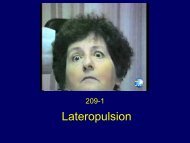Horizontal Gaze Palsy
Horizontal Gaze Palsy
Horizontal Gaze Palsy
You also want an ePaper? Increase the reach of your titles
YUMPU automatically turns print PDFs into web optimized ePapers that Google loves.
HARVARD MEDICAL SCHOOLDEPARTMENT OF NEUROLOGYMASSACHUSETTS GENERAL HOSPITALOne and a Half SyndromeShirley H. Wray, M.D., Ph.D.Professor of Neurology, Harvard Medical SchoolDirector, Unit for Neurovisual DisordersMassachusetts General Hospital
The One-and-a-Half SyndromeOn horizontal gaze there is:An ipsilateral gaze paresis or palsyAn internuclear ophthalmoplegia (INO) oncontralateral gazeAt rest, the eyes are:Orthophoric, or, in acute stageIpsilateral eye esotropic orContralateral eye exotropic (Paralyticpontine exotropic)
Three possibilities to account for anipsilateral horizontal gaze palsy: may bedue to unilateral lesion affectingThe ipsilateral PPRF onlyThe ipsilateral abducens nucleus aloneBoth the ipsilateral PPRF andabducens nucleus
Abducens NucleusAll the cells necessary for ipsilateralhorizontal gaze:Motoneurons whose axons form the sixthnerve (VIN) to innervate the ipsilaterallateral rectus muscleInternuclear neurons which send axonsacross the midline to opposite MLF andultimately to the medial rectusmotoneurons in the contralateraloculomotor nucleus (III N).
Pathogenesis of Certain SignsOcular MotorDeficitIpsilateral adductionweaknessIpsilateral slowedabducting saccadesContralateral abductionnystagmusPossible PathophysiologicSubstrateInterruption of axons of abducensinternuclear motoneuronsInadequate inhibition of medialrectus motoneuronsImpaired inhibition of contralateralmedial rectus orInterruption of descending fibersto contralateral abducens nucleusorInvolvement of adjacent PPRF
Neurology 1983; 33:971-980
Reported Boston Totalcases seriesBrainstem Infarct 12 4 16Multiple Sclerosis 2 14 16Pontine Glioma 2 1 3Arteriovenous Malformation 1 0 1Pontine Hemorrhage 8 0 8Basilar Artery Aneurysm 0 1 1Cerebellar Astrocytoma 2 0 2Metastatic Melanoma 1 0 1Ependymoma Fourth Ventricle 1 0 129 20 49Table 1. The one-and-a-half syndrome: Etiology
Diplopia 12Blurred Vision 8Oscillopsia 4Difficulty looking to one side 2“Quivering” of the eye 1No visual complaint 3Table 2. One-and-a-half syndrome (N = 20): Visual Symptoms
(N = 20)<strong>Gaze</strong>-evoked upbeat nystagmus 12Skew deviation 8<strong>Horizontal</strong> ipsilateral gaze nystagmus 4Rotary component to horizontal ipsilateral gaze nystagmus 2Spontaneous nystagmus to the contralateral side 1Absent or impaired convergence 5Saccadic vertical pursuit 9<strong>Gaze</strong>-evoked downbeat nystagmus 4Impaired upward gaze 1(N = 11)Exotropia 4Esotropia 3Orthotropia 4Table 3. One-and-a-half syndrome (N = 20;11): Associated ocular motility signs
Esotropia of theipsilateral eye
Patient 1. The one-and-a-half syndrome (A) Mild left INO looking right. (B) EsotropiaOS (ipsilateral) in the primary position of gaze. (C) <strong>Horizontal</strong> conjugate gaze palsyattempting to look left. (D) Normal convergence.
Paralytic PontineExotropia
Patient 2. Paralytic pontine exotropia. (A) <strong>Horizontal</strong> conjugate gaze paresislooking right. (B) Exotropia OS (contralateral) in the primary position of gaze. (C)Right INO looking left. (D) Right “peripheral-type” ipsilateral facial palsy. (E)Impaired convergence.
Patient 2. Paralytic Pontine ExotropiaA. <strong>Horizontal</strong> conjugate palsy looking right.B. Exotropia OS contralateral in the primaryposition of gaze.C. Right INO looking leftD. Right “peripheral-type” ipsilateral facialpalsyE. Impaired convergence
In paralytic pontine exotropia the exotropiceye shows:Abduction nystagmus during attemptsto move it laterallyExtreme slowness of adductionsaccades when eye fixing to move it tothe midline
Paralytic Pontine Exotropia attributed to:Tonic contralateral deviation of the eyesImplies acute ipsilateral PPRF lesionFailure of ipsilateral eye to deviatemedially explained by the INO
Paralytic pontine exotropia OS
Paralytic pontine exotropiaright horizontal gaze palsy
http://www.library.med.utah.edu/NOVEL
















